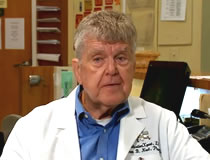October 27th, 2014
ProSavin May Benefit Patients with Advanced Parkinson’s Disease
ProSavin May Benefit Patients with Advanced Parkinson's Disease
January 30, 2014
NEW YORK - Patients with advanced Parkinson's disease may have improved motor responses with ProSavin, a lentiviral vector-based gene therapy, according a phase 1/2 open-label trial.
ProSavin, designed to restore local and continuous dopamine production in those patients, was also safe and well tolerated, the authors wrote in their study, online January 10 in The Lancet.
"This study was the first trial ever worldwide to directly administer a lentiviral vector-based product to patients. It was the first gene therapy approach to deliver the three key enzymes in one vector required to convert cells in the brain to manufacture dopamine, the neurotransmitter that is depleted in Parkinson's disease," lead author Dr. Stephane Palfi, from Henri Mondor Hospital of the Universite Paris-Est Creteil in Creteil, France, told Reuters Health by email.
"Although we will need to conduct Phase II and Phase III trials, ProSavin has to date demonstrated favorable safety, tolerability and long-term improvement of motor function," he added.
Dr. Palfi and several other authors are consultants or former consultants for Oxford BioMedica, which funded the study and manufactures ProSavin. Several authors are employees or former employees of Oxford BioMedica.
They conducted a phase 1/2 open-label trial of patients with Parkinson's disease who received a bilateral injection of ProSavin into the putamen at one of two study sites in France and the UK. The patients were 48 to 65 years old with disease duration of five years or longer, motor fluctuations, and a 50% or higher motor response to oral dopaminergic therapy.
Between 2008 and 2011, the authors enrolled all 15 patients in a separate open-label follow-up study to provide up to nine years of safety data. Three doses were assessed in separate groups: low dose (1.9 10^7 transducing units, or TU); mid dose (4.0 10^7 TU); and high dose (1.0 10^8 TU).
The researchers gave three patients the low dose, six patients the mid dose, and six patients the high dose. Over the first 12 months of follow-up, 51 mild and three moderate adverse events were reported, the most common being increased on-medication dyskinesias (20 events in 11 patients) and on-off phenomena (12 events in nine patients). No serious adverse events related to the surgery or to ProSavin were reported.
Compared with baseline, all 15 patients had significantly improved mean Unified Parkinson's Disease Rating Scale (UPDRS) part III motor scores off medication at six months (mean score 38 vs. 26; p=0.0001) and at 12 months (38 vs. 27; p=0.0001).
"The long-lasting benefits we have seen to date give us great hope for this product and the underlying technology," Dr. Palfi said.
"Indications are that the highest 5x dose of ProSavin provided the greatest level of dopaminergic activity, with the greatest mean improvement in motor scores; a consistent reduction in requirement for oral dopaminergic medication; and possible dopamine provision attributable to ProSavin from functional imaging data," he added.
Dr. A. Jon Stoessl, whose editorial accompanied the study, told Reuters Health, "Regarding efficacy, the data that were shown look interesting and the treatment might help the symptoms in Parkinson's disease. However, the study did not include a placebo or sham-operated group, and imaging data are confusing."
Dr. Stoessl, of the University of British Columbia in Vancouver, Canada, added, "This was a technical advance and showed that ProSavin was safe and well tolerated over the duration of the study. These are important positives, but whether this is a brand new breakthrough for Parkinson's disease is not clear."
Dr. Stoessl does not receive funding from Oxford BioMedica, but has consulted for other pharmaceutical companies.
SOURCE: http://bit.ly/1cyCZvA and http://bit.ly/1idrZ7M
Lancet 2014.
- July 8th, 2015
Factors associated with medication regimen complexity in older people: a cross-sectional population-based studyRead - August 17th, 2014
Alcohol Intake and Atrial FibrillationRead - August 12th, 2012
Hawkes Library Book SigningRead - December 4th, 2014
Diabetes: Can You Hear Me Now?Read - July 5th, 2015
What’s the Safest Way to Administer Testosterone?Read
Geriatric Nutrition
Without good nutrition, positive drug therapy outcomes are very difficult to obtain, For the best in Geriatric Nutritional Information
Find out more Optima SolutionsContinuing Education
Each month we will post an analysis of specific aspects of government long-term healthcare regulations.
Find out more


